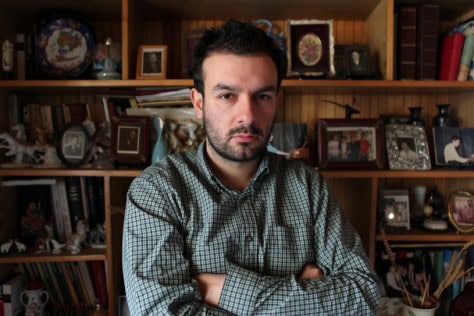Joseph Gordon-Levitt has put on a tie, as he does before every interview. This wouldn’t be noteworthy if not for the fact that we’re talking to each other on the phone. “Yeah, I put on a tie to talk to you,” he admits, laughing at the absurdity. “Doing interviews requires a certain mindset. You have to speak in a way that’s quotable and translates to text—if I put on a tie it helps me remember that.”
Professional attire or not, the 26-year-old possesses an air of sophistication and professionalism that is well beyond his years. (This is a kid who, at 18, quit acting to go to Columbia where ended up taking classes only in French, which he found more interesting. “Even if some student was saying some bullshit, they were saying it in French, so it was still teaching me something.”) He’s been a part of Hollywood for over twenty years and has, against all industry odds, turned out to be shockingly normal. After a very successful run as a child star (his performance in Robert Redford’s A River Runs Through It won him a Young Artist Award as the “Best Actor Under Ten”) and a teen actor (yes, he is that dude from 3rd Rock from the Sun), Gordon-Levitt has also emerged as one of the most powerful young actors in independent film. In 2004 he won critical acclaim, and the top award at the Seattle Film Festival, for his portrayal of a homosexual prostitute in Gregg Araki’s Mysterious Skin. He starred in 2005’s postmodern film noir Brick, which won a Special Jury Prize at Sundance for its “Originality of Vision.” And while there are two camps that know this kid quite well (those who watched him for six years on said 3rd Rock, and those for which the indie films are cult obsessions) he is relatively unknown to the majority who find no home in either faction.
That’ll change soon enough, since in 2007 he returns with leading roles in three major films. In March, he stars in The Lookout, Academy Award-nominated writer Scott Frank’s (Out of Sight, Get Shorty) offbeat heist flick. He plays a once-promising high school hockey player who, after suffering severe brain damage following a car accident, takes a job as a janitor on the graveyard shift and finds himself entangled in a bank robbery. Following that, he will play an American solider in Iraq alongside Ryan Phillippe and Channing Tatum in a film by Kimberly Peirce (the director who made Hillary Swank a household name in Boys Don’t Cry). And then there’s Killshot, a film by John Madden (Shakespeare In Love, Proof), where he stars as a psychopathic young killer in a cast that includes Mickey Rourke, Rosario Dawson and Johnny Knoxville.
While his recent work has been fairly mainstream, Gordon-Levitt believes that the days of the multi-multi-million-dollar studio film are coming to an end. “The only reason that those crappy movies have made money is because, in the past, there haven’t been other options. But now all you need is a video camera and a computer and an Internet connection to make something and put it out there. The people who are just apathetically making bad stuff to make money are gonna be out of job, which will be great. The difference is: what are people doing it for? Do they love it or are they just trying to make some money? Is there a story to tell here, or is it just a marketing ploy?”
He points to the record industry. “Tower Records just went out of business,” he says, emphatically. “And the only difference between selling movies and selling music is the difference between megabytes and gigabytes. Record companies are shrinking and dying, and they deserve to die! They’ve ripped people off for long enough.”
If being in the mainstream while trashing the system is biting the hand that feeds you, at least Gordon-Levitt does it passionately—he’s an articulate, opinionated individual who’s been at this for a long time, for the right reasons. He’s an educated polymath who’ll bring up Camus and Salinger along with The Pixies and Nina Simone. He studied Serge Gainsbourg and Tom Waits to help him with the stylistic cadences of Brick. He plays guitar and records the music for his own short films, projects he makes with friends, who he also runs around with “chasing girls,” another of his hobbies—though he says he’s not chasing any particular girl right now. He loves Welles and is enamored with Jean-Pierre Jeunet, the director of Amelie, because his films are “beautiful—[and] there’d probably be a lot of cute French girls running around.” He would like to do more work in theater, and, he’d also like to be a clown—not the traditional American variety, but one in Slava’s Snow Show, the famous Russian troupe (because “without words they convey such powerful emotions”).
Perhaps in anticipation of 2007’s upcoming exposure, Gordon-Levitt is quick to point out that he’s an actor, not a celebrity, a word he abhors. A certain hostility to that Hollywood culture is evidenced by Gordon-Levitt’s short film, A Picture of Assholes, in which he turns his own camera on a crowd of aggressive paparazzi gunning for his photo. “Celebrity is giving into the idea that certain people are better than others, and I say: fuck that, we’re all people,” Gordon-Levitt exclaims. “We’re all beautiful. We all deserve attention.”
And Gordon-Levitt’s not content to simply run through the motions of a role—the parts he chooses can end up having a very real effect on the young actor. For the Peirce project, playing a soldier in a war that’s still unraveling on CNN flipped his perspective from the macro to the micro. “Before I did the film, my only experience of the war was what is presented to me in newspapers. I never thought of it from the soldier’s point of view,” he says. “So for the first time I let that geopolitical view slip away and really just started thinking about surviving and helping your brothers survive. A lot of people say ‘support the troops,’ but who’s actually listening to what [the troops] say? We’re putting the cameras on politicians and newscasters and letting them talk 24 hours a day, yet when do you ever hear what the soldiers are saying?”
While grandstanding celebrities who use their status to plug empty causes bug the hell out of Gordon-Levitt, he felt strongly enough about the issue to take action. He’s currently organizing a YouTube-style website, an online forum that will let soldiers in Iraq share their stories. “There is a big difference between, say, George Clooney, who uses his skills as an actor and a filmmaker to make a whole movie that’s relevant to today’s world, versus a celebrity who’s basically saying, I’m more important than everyone else, so my opinion matters more. Listen to what I say and give money to this charity,” he explains. Gordon-Levitt doesn’t want to be a filmmaker’s prop, emptily reciting his lines “The point of acting [is] to affect people. When I hear that I’ve done something that made someone laugh or made someone cry or made someone think, that’s what inspires me to continue doing what I’m doing. And it’s not just artists who can do that—it’s everybody. Every single person in the world can apply their time and effort and power toward what they believe in. Everyone with a computer and an Internet connection can get their voice heard. Isn’t that exciting?”
Gordon-Levitt’s atypical and democratic outlook is an anomaly for a young star with a foot in both mainstream television and indie cinema. It’s no surprise to learn that he’s the product of parents who were never in the film industry—peace activists when they met, they raised Gordon-Levitt “on The Beatles,” in Sherman Oaks, California. They lived down the street from the casting facility where he started auditioning at age 6, since it sounded like a fun idea. “We don’t have kings and queens in this country—we had to put someone up on pedestals, and we chose the movie star. Actors didn’t use to be celebrities,” he says. “They used to be like carnie trash. Theatres were next to brothels.”
Though times have changed—carnie trash typically doesn’t land on the cover of glossy magazines—Gordon-Levitt’s still made his name playing the marginalized, damaged, the outcast. In 2001’s Manic, his first starring role in a feature film, Gordon-Levitt is an angry teenager locked in a juvenile mental institute after bashing a kid’s head in with a baseball bat. His other characters are a daunting lot: prostitute, solider, a murderer, a victim of brain damage. “It’s not that I only want to do dark or sort of marginal characters,” he says. “I just want to work on things that I think are good. A lot of it is really crappy. Good writing inspires me.”
Several of those rare well-written roles have been gay characters, or straight character in gay-themed films: an AIDS patient in 1998’s Sweet Jane, a Mormon in the lightweight gay drama Latter Days. He was Eric’s gay lab partner on an episode of That ‘70s Show, and an ambiguously sexy gay hustler, haunted by memories of molestation, in the graphic and beautiful Mysterious Skin. It’s led some fans to wonder about the nature of his real-life sexuality.
“This is kind of embarrassing, but I recently put my name into a search engine, and someone posted, Is Joseph Gordon-Levitt gay? and the answer posted was: Is he an alien? because I played [one on 3rd Rock],” he says. “Right now I’m in Toronto playing a psychopathic murderer. And recently I played someone who was in the U.S. army in Iraq. So it’s like: what’s harder? Kissing a dude or killing people? I would hope that I can feel at least a bit of the horror of what it must be like, when I was playing a soldier, how hard it must be, the hell they go through. So, kissing Topher Grace is like: whatever.”
 Q&A with Larry Gus
Q&A with Larry Gus We Own the Night: The Edison
We Own the Night: The Edison
No Comments